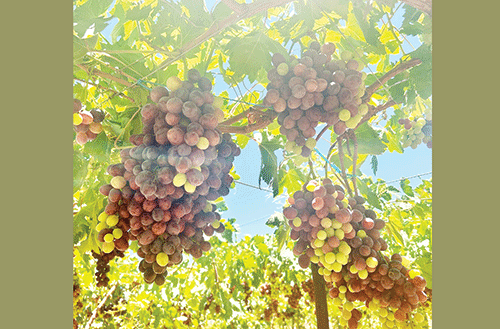ETUNDA – In a groundbreaking leap for agriculture, northern Namibia is stepping into the spotlight with its very first grape harvest.
This remarkable feat proves that even the harshest climates can yield sweet success.
The Otjimbele Agriculture Project, led by CEO Carlos Lertxundi, is not just cultivating grapes.
It is sowing the seeds of economic transformation and community empowerment in the heart of the Omusati region.
Walking through the bustling grape farm, one could feel the vibrant energy of the workers as they moved joyfully among the lush plants.
Some were carefully sorting grapes, preparing to load them onto a truck.
Others tended to the vines with evident care and dedication.
Imagine biting into a plump, juicy grape, knowing it was grown in an area once deemed unsuitable for such crops.
This dream is now a reality – thanks to Otjimbele’s innovative approach.
In just 12 short months, after planting a 15-hectare trial plot, the first grapes are being harvested and sold locally.
This rapid turnaround is a game-changer, especially when traditional grape farming takes two to three years.
The secret? Cutting-edge techniques and specially bred cultivars from Spain’s prestigious ITUM Research Institute, designed to thrive in extreme weather conditions.
“It’s incredible to see grapes thriving in northern Namibia,” Lertxundi remarked.
“Everyone said it was impossible, but we’ve proven that with the right technology and determination, we can overcome any challenge,” he added.
The Namibia Investment Promotion and Development Board (NIPDB) this week took six journalists to visit the grape farm.
This project is one of numerous in the country, facilitated by NIPDB.
The impact of this initiative goes far beyond delicious grapes.
With an impressive investment of N$120 million, Otjimbele has already created around 150 jobs, with plans to expand that number to nearly 400 as commercial production ramps up next year.
This influx of employment opportunities is vital for local communities, providing much-needed livelihoods in the area.
“Our goal is not just to grow grapes but to uplift our community. We want to create sustainable jobs, and empower local farmers with new skills,” Lertxundi emphasised.
As Namibia grapples with food security challenges, Otjimbele is strategically positioned to fill critical gaps in the market.
By cultivating high-value crops like grapes, sweet potatoes and watermelons, the project aims to reduce reliance on imports, while satisfying local demand.
The farm also has asparagus, maize and wheat.
The grapes will not only grace local markets but will be exported to neighbouring countries such as South Africa, Botswana, Zambia and Angola, tapping into a regional appetite for fresh produce.
“By focusing on high-value crops, we’re ensuring that our produce meets both local needs and export opportunities,” Lertxundi stated confidently.
Looking ahead, Otjimbele has ambitious plans to expand grape cultivation to 200 hectares.
But it does not stop there.
An innovative fresh produce centre is functional and complete with cold storage facilities, revolutionising how agricultural products are processed and distributed in the region.
This is another job-creation opportunity, as locals were seen busy sorting and packaging the products.
Of course, no great venture comes without its hurdles.
Recent security concerns have posed challenges, including incidents of theft that disrupted irrigation efforts.
Lertxundi has called for increased support from local authorities to safeguard the promising project to ensure its continued success.
“We need collaboration from all stakeholders to protect our investments, and ensure that this initiative can thrive,” he urged.
The first grapes from northern Namibia are more than just a harvest.
They represent a bold new chapter in the region’s agricultural history.


